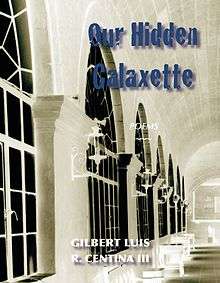Gilbert Luis R. Centina III
| Gilbert Luis R. Centina III | |
|---|---|
 | |
| Born | La Carlota City, Philippines |
| Occupation | Roman Catholic priest, author |
| Nationality |
|
| Alma mater | University of the Philippines, University of Santo Tomas |
| Genre | Fiction, poetry, nonfiction |
| Subject | Clericalism, religious mythology and mysticism |
| Notable works | Rubrics and Runes, Glass of Liquid Truths,Somewhen, Triptych and Collected Poems,Getxo and Other Poems |
| Website | |
|
www | |
Gilbert Luis R. Centina III of Belleville, New Jersey, an award-winning Catholic poet,[1] is the author of five poetry books and two novels. Respected for his poetry,[2][3] his works have been anthologized in Philippine high school and college textbooks.[4] Besides English, he also writes in Spanish and in two Philippine languages, Hiligaynon and Tagalog. From the Asian Catholic Publishers and the Archdiocese of Manila under Cardinal Jaime Sin, he received the Catholic Authors Award in 1998.
Education
An Augustinian friar[5] under the Spanish circumscription of the Augustinian Province of the Most Holy Name of Jesus of the Philippines, he entered the Augustinian Monastery in historic Intramuros, Manila and attended the University of Santo Tomas,[6] the Philippines' royal and pontifical university. He graduated cum laude in each of his four ecclesiastical degrees from the University of Santo Tomas: BA classical, Ph.B., STB, and STL. He earned his MA in comparative literature at the University of the Philippines and pursued a Ph.D. in comparative literature at another state university but left without completing his dissertation.
After his ordination to the priesthood, he briefly served as a missionary in Peru. He taught literature as a professorial lecturer, served as a school chaplain for many years and as pastor of a Manhattan parish church.[7][8][9] Along the way, he authored hundreds of newspaper columns and magazine articles as well as edited a scholarly journal on St. Augustine and contributed poetry and fiction to literary publications. He currently lives and works in Spain.[10]
Latest literary projects and criticisms
On April 7, 2013, he published Somewhen[11] in the United States, his third poetry book. Portland Book Review[12] described Somewhen as "modern poetry at its best," adding that "for modern poetry to be this eloquent and thought provoking is a grave task that Centina III accomplishes splendidly." Sacramento Book Review[13][14] called the book "lyrical" and "positively radiant" and noted that it is "deeply rooted in religious history, mythology and mysticism." The collection, it added, "honors the [Catholic] church's fortitude, individual spirit and conviction, belief and the voyage thereof."
The collection marked his comeback to poetry writing after a long hiatus that followed his winning the Focus Literary Awards in poetry in 1982. Along the way, he devoted himself to his priestly duties and limited his writing to newspaper columns. During this time, he served as editor-in-chief of Search, a journal on the life and works of St. Augustine of Hippo published in Makati City, Philippines by Colegio San Agustin-Makati.[15] Somewhen[11] was followed by the publication of Rubrics and Runes (New York: June 2013), Triptych and Collected Poems (New York: August 2013) and Getxo and Other Poems (New York: January 2014). His earlier books of poems, Our Hidden Glaxette and Glass of Liquid Truths, were also republished in May 2013.

His first novel is a roman à clef, written under a nom de guerre. The novel, Wages of Sin, was published as a limited edition in Honolulu in 1988. On June 20, 2013, he released under his real name his controversial second novel Rubrics and Runes, a satire tackling clericalism, simony, financial shenanigans and sex abuse in the Catholic Church as perpetrated by some misguided churchmen.[16][17]
According to the blurb of Rubrics and Runes, it "tells the story of a friar who gets caught in the maelstrom of conventual and secular politics when the two supposedly incongruous worlds collide. When José Morán entered the monastery, it was to pursue the highest form of chivalry. But his fate as a religious priest takes a precipitous turn when social paroxysm grips the fictional island-nation of Islas e Islotes after the downfall of the government. To cover up his own misdeeds, his abominably corrupt religious superior leading a double life seizes the ensuing chaos and collaborates with human rights violators in military uniform to accuse the completely innocent friar of a fabricated heinous crime. The plot unravels as those who claim to follow Christ wade into politics, taking for granted his injunction to 'render therefore unto Caesar the things which are Caesar’s and unto God the things that are God’s.'"
In an article titled "Una Perspectiva Históríca de la Poesía Hispanofilipina"[18] that he wrote for Universidad de Murcia, Edmundo Farolan, poet and correspondent[19] of the Real Academia Española, cited Centina's poetry in Spanish as belonging to an avant-garde group of Filipino poets who “in addition to Castilian...write in other languages and in different styles and themes—free verse and prose, to traditional metrics surrealist themes, Dadaists and protest, realistic subjects, religious and serene. Avant-garde, but returning to the castellano classics: Quevedo, Gongora, Santa Teresa de Jesus, Manrique and Garcilaso de la Vega."

Works
- Poetry:
- Our Hidden Galaxette, [first edition, Manila: 1970; second edition, New York: 2013].
- Glass of Liquid Truths [first and second editions, Makati: 1974; third international deluxe edition, Iloilo City: 1979; fourth edition and first printing in the United States, New York: 2013].
- Somewhen [New York: 2013].
- Triptych and Collected Poems [New York: 2013].
- Getxo and Other Poems [New York: 2014].
- Novels:
- Wages of Sin [Honolulu: 1988].
- Rubrics and Runes [New York: 2013].
- Others:
- Copy Editor, John Paul II in Iloilo [Iloilo City: Roman Catholic Archdiocese of Jaro, 1981].
- Editor (2002–05), Search, The Augustinian Journal of Cultural Excellence.
Awards
- Catholic Authors Award
- Focus Philippines Literary Awards, poetry
- Don Carlos Palanca Memorial Awards for Literature, English poetry, 1974
- University of Santo Tomas Annual Rector's Literary Prizes, English poetry and short story
- Named as one of the outstanding chaplains of the Philippines in the year 2000, Knights of Columbus, Manila.
External links
- Farolan, Edmundo, An Historical Perspective of Filipino Spanish Poetry, University of Murcia, Spain.
- Extended Hours, One Day Only: Absolution in the City, The New York Times. Retrieved 25 June 2013.
- USA: East Harlem, Augnet.org. Retrieved 25 June 2013.
- Course Outline-Philippine Literature. Retrieved 25 June 2013.
- Bonifacio, Andrew Isiah P. The Varsitarian at 80 Exhibit. Retrieved 25 June 2013.
- Flynn, Fr. John. Changes in Religious Identification, Zenit.org, The World Seen from Rome. Retrieved 26 June 2013.
- 'Priest Launches Book on Cassocked Hypocrites', Ucannews.com. Retrieved 27 June 2013.
- 'Priest Unmasks Cassocked Hypocrisy in Latest Novel,' GMANews. Retrieved 4 July 2013.
- 'New Way to Support Old Church,' The New York Times. Retrieved 4 July 2013.
- Sacramento Book Review.
- Portland Book Review
References
- ↑ 1974 Palanca Awards
- ↑ "USA: East Harlem". www.augnet.org. Retrieved 29 April 2015.
- ↑ "About USA". www.usa.edu.ph/. University of San Agustin. Retrieved 29 April 2015.
- ↑ "The Course Outline". Philippine Literature Page. Retrieved 29 April 2015.
- ↑ Fernandez, Manny; Warren R., Matthew. "Extended Hours, One Day Only: Absolution in the City". www.nytimes.com. The New York Times. Retrieved 29 April 2015.
- ↑ Bonifacio, Andrew Isiah P. "The Varsitarian at 80 Exhibit: The Struggle and the Glory". www.varsitarian.net. University of Santo Tomas.
- ↑ Mallozzi, Vincent M. "New Way to Support Old Church". www.nytimes.com. Retrieved 29 April 2015.
- ↑ Flynn, LC, Father John. "Changes in Religious Identification A Call to Reconciliation During Lent". www.zenit.org. Zenit. Retrieved 30 April 2015.
- ↑ Daly, Michael. "Sad, labored steps to church that is no more". www.nydailynews.com. New York Daily News. Retrieved 30 April 2015.
- ↑ "Informaciones del Consejo Provincial: Casa de Neguri" (PDF) (July–December 2014). Augustinian Province of the Most Holy Name of Jesus of the Philippines. Retrieved 29 April 2015.
- 1 2 "Somewhen". www.gilbertluisrcentinaiii.com. Retrieved 29 April 2015.
- ↑ Pittman, Taylor. "Modern Poetry at Its Best". www.portlandbookreview.com. Smyth Enterprises, LLC. Retrieved 29 April 2015.
- ↑ "Somewhen". www.gilbertluisrcentinaiii.com. Retrieved 29 April 2015.
- ↑ "Book Review: Somewhen". citybookreview.com. Sacramento Book Review. Retrieved 30 April 2015.
- ↑ "Biography". www.gilbertluisrcentinaiii.com. Retrieved 1 May 2015.
- ↑ Arcangel, Xian. "Pinoy priest unmasks 'cassocked hypocrites'". www.gma.network.com. Retrieved 30 April 2015.
- ↑ "Priests launches book on 'cassocked hypocrites'" (PDF). www.ucanews. The Union of Catholic Asia News. 3 July 2013. Retrieved 30 April 2015.
- ↑ Farolan,, Edmundo. "Una Perspectiva Histórica de la Poesía Hispanofilipina". www.um.es. Universidad de Murcia. Retrieved 29 April 2015.
- ↑ "Academia Filipina de la Lengua Española: Academicos". www.asale.org. Asociacion de Academias de la Lengua Española. Retrieved 29 April 2015.